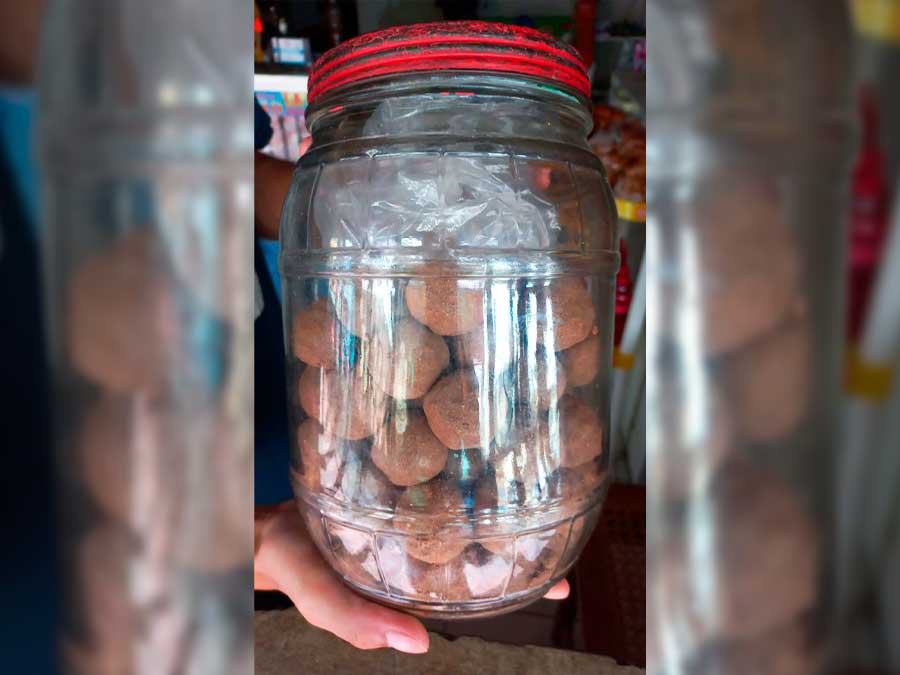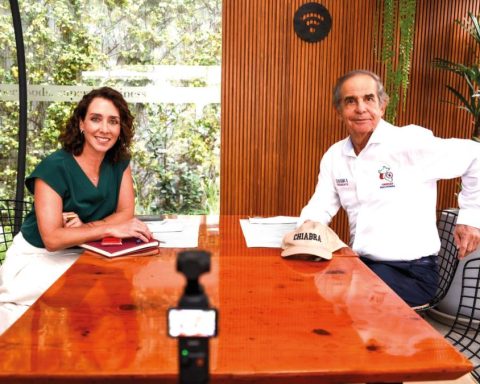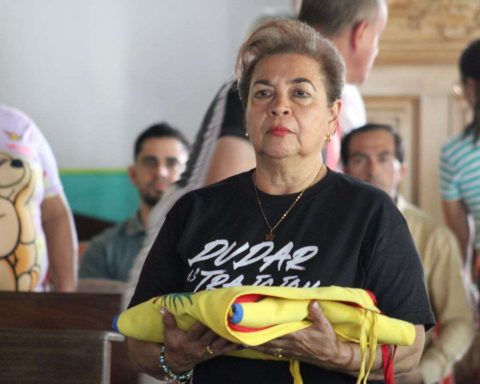Neither the adolescent who runs errands at home, nor the person in charge of dispatching at the grocery store would understand today what “Machos” are. This old product that is a kind of instant pinolillo is in extinction. The people from Matagalpa who made it en masse stopped making it and with this they almost buried a whole history of parents and grandparents on this side of the country.
The “machitos” are mainly pinol balls, to which cocoa is added. It was seen by the children of yesteryear as chocolate “made in” Matagalpa. The naughty ones poured a little water and sugar and that’s it, they “played son”. But at home, it was the main soft drink base that was not lacking. Industrious hands of mothers and grandmothers of yesteryear drove children crazy with the product.
“My grandmother taught me how to do it and told me that learning would help me survive,” says Lydia Dormus, a 65-year-old woman who lives in the southern area of Matagalpa near the cemetery, in the area known as the Islita. She is perhaps one of the last artisans still dedicated to making “machos” or “machitis”. She remembers that she learned it in the same place where she has still made it for more than 50 years. “There was no house where they did not use them to make the pinolillo pitcher that accompanied lunch,” Dormus reports.
Related news: Matagalpa dawns as if nothing had happened, municipal votes were ignored
“I learned to do this from my grandmother, Teresa Dormus Aguilar, I was 13 years old and she told me that she was going to teach me how to make “machos” and 52 years later, I still do it. Although now people prefer other things, I have lived all my life from this, ”she says proudly.
Dormus assures that since her grandmother passed away, she has kept the tradition of making the “machos”, although she regrets that people do not look for them as before. “Few buy it, but there are still people who like it, thank God. People prefer, I think, those artificial soft drinks that are already sweetened, even if they are unhealthy, or the packaged pinolillo that is not healthy either, ”she criticizes.
The sale that helps to survive
Dormus’ “factory” is his home, his machines are his hands. In the comfort of her house in a rocking chair with a corduroy and the still unmolded powder pinol, it is with tranquility that she works. She does it relaxed, in full view of her backyard chickens. She makes 500 “machitos” balls a week to deliver them to different sales in the city.
“I remember that with my grandmother we would deliver a lot of balls in Guanuca, we would even leave them in canteens.” She regrets that even in Matagalpa, the product is also replaced by the pinol from sachets. “The truth is that it doesn’t even compare in taste, it will never be the same as that of the males,” she reiterates.
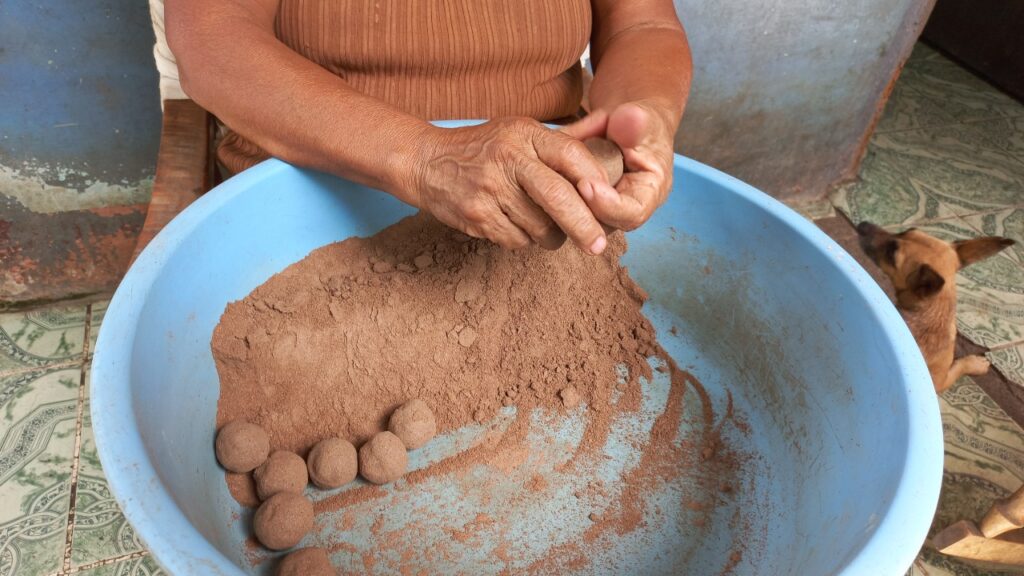
Doña Lydia lives alone in her humble home, her children are married and sometimes she is accompanied by her grandchildren. She says that she lives a very quiet life, and twice a week she makes the “machos”, on Mondays and Fridays. “I invest 800 córdobas buying corn and cocoa, I only get 300 of profit, and that’s what I eat, the rest I invest again and that’s how I help myself with expenses,” she explains.
The artisan admits that another enemy of the “machos” are the prices of corn and cocoa. They go up almost weekly. This sometimes makes it difficult for her to acquire the raw material, however, she has married the idea that she should continue making them until she can’t anymore. “It’s just that it’s a tradition, even if you earn less each time,” she says.
“Machos” travel to the United States
He recounted that his mother died when he was three years old. “My grandmother raised me, before we used to grind corn with traditional mills, because there were no big mills here in Matagalpa, and over the years I had more customers, currently I sell 500 “Machos” balls in some sales here Matagalpa, lately, they are also ordering me to send them to the United States”, commented the 65-year-old from Matagalpa proudly.
Uriel Ramón Cardoza, a Matagalpino historian, tells that in his childhood he tried the “Machos”. He remembers with great nostalgia when his parents sent him to buy the balls for the fresh lunch. “They sent me to buy up to a dozen males for lunch since we were a large family, each male was for a glass of fresh food,” he recounted.
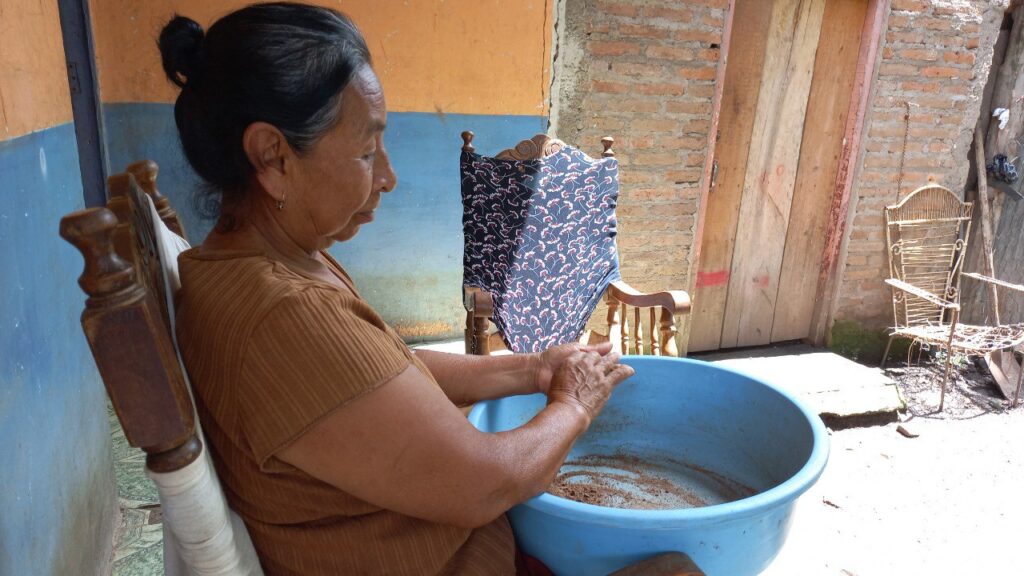
Cardoza assures that in his years as a historian he has talked with friends from the department of León who have told him that the “Macho” is not known in that western area, concluding that this product is merely from the north of the country.
He regrets that although it is part of the tradition, of the country’s culture, authorities have allowed it to be replaced by modern products that are sold in sales such as bagged pinolillos, or chocolita and gluglu and already sweetened instant fresh sachets.
Some grocery stores still sell them
Carmen Montoya has a small grocery store in her house. She assures that she never lacked among her products the “machitos” and that of course, people looked for it more before. She said that for the last three years, she has had a special vase for pinolillo balls in her grocery store. “Here I continue to sell them in the same place as 30 years ago. The ball costs two córdobas, before it was worth 50 cents, ”she recalled.
“This vase (shows it) is a relic in my house and in my little window, they have wanted to buy it for me, but I have not wanted to sell it, it is special for my “Machos”, now people no longer sell this, look here on There are seven sales on this block and no one, only me, sells males”, she said, happy to know that people write about the product.
Related news: Sandinistas in Matagalpa go from house to house calling to vote
“Here I make my son fresh pinol, he took out two “machos” and I make his pitcher. Every eight days, Mrs. Lydia Dormus brings me and I buy her 100 pesos of males. We keep a tradition alive,” she assures.
The males “travel friends”
Eddy Kühl, a Matagalpino historian, says that the males were used a lot by Nicaraguan travelers, when they had to cross cities on journeys that in the past took days. According to the also writer, the product was mixed with water from the rivers and they already had their soft drink to continue the journey.
“The Macho does not rot because it is dry, the traveler took them for his drink, just as they took salted meat and dried in the sun. One ball of Macho is for two jícaras, since there were no metal containers and the glass ones broke on the trip, ”he explains. “El Macho is part of our culture and gastronomic tradition in northern Nicaragua,” reiterates Kühl.
